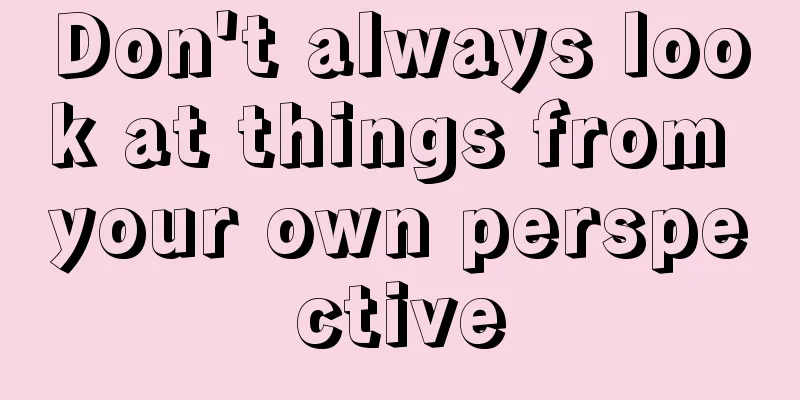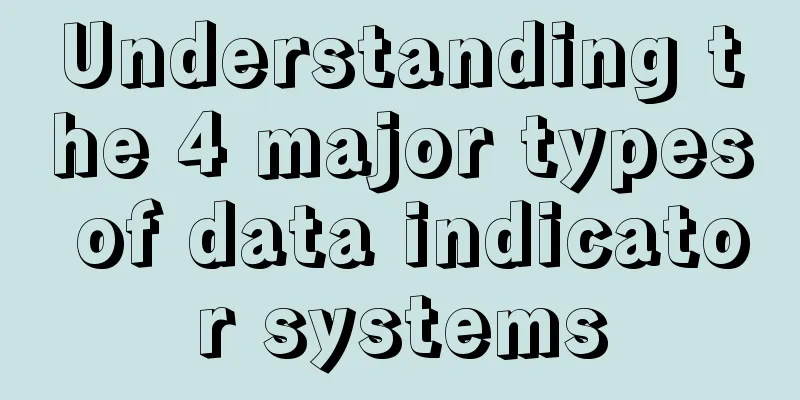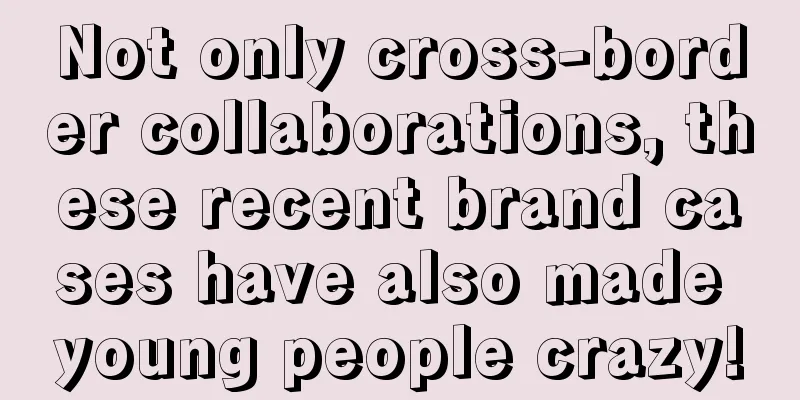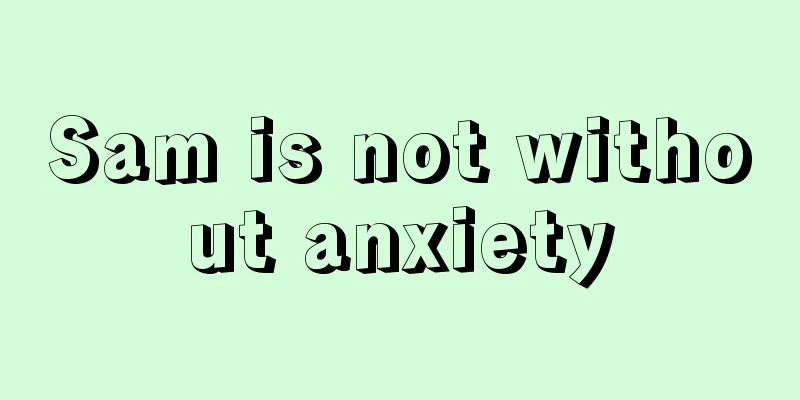Don't always look at things from your own perspective

I encountered a scam the day before yesterday and lost several thousand dollars. Friends around me sent me private messages one after another. Some said that spending money would ward off disasters, and some said, "Oh my God, Zhiyuan, how could you make such a low-level mistake? I... People always like to look at things from their own perspective. Later, I reviewed the situation and found that the key to the success of the scammers was that they used the opposite logic. Similarly, at work, as a marketer, if you ask me what is the most important ability, I think it is still to return to the "user perspective". This may sound a bit big because it covers too wide a range. For example, building a community is not just about bringing together a bunch of people with common characteristics. Everyone may be excellent, but if they are in different industries, it will be difficult to find a common language. Or, even if you are a big brand, you cannot think that you are invincible. Just like no matter how good Moutai is, you cannot make a successful "Moutai beer" because in the eyes of users, Moutai should be a bottle of high-end liquor. In fact, almost everything needs to be viewed from a user perspective. This is because everything affects each other, and everything we do needs to take into account the needs of other factors, not just ourselves. But it is really difficult to do this. It is not that we are not smart enough, but after billions of years of evolution, we are used to considering our own interests first. This is the law of species evolution. So, combined with my work, I began to think about how to truly look at problems from the user's perspective at critical moments and avoid falling into a state of self-satisfaction. 1. What is self-perspective?Simply put, from the perspective of "I", how I am, what I want, what I have paid, why I am so poor, why I can't make money, etc. "I" is a subjective experience. A few days ago, a boss added me on WeChat and said: I see that your articles about marketing thinking are quite professional. I’m in the agricultural and sideline products business, and my sales haven’t been good recently. How can I increase sales? I politely replied, “Nice to meet you, nice to meet you,” and didn’t say anything else. Why? On the one hand, this way of asking questions is terrible. Such a big question is enough to open a project seminar. I am not a god, so I really don’t know how to answer it. I mean, are you better at making short videos? Or are you better at expanding B-side channels? These are ultimately nonsense. On the other hand, whether I am professional or not has little overlap with the business itself. On the contrary, communication itself is about finding out "why" rather than "what". Finally, I gave him a suggestion, why not try to think about where the problem is first? Do some elimination, and then solve it in a targeted manner. This incident reminds me of an interesting story: When Claude Elwood Shannon, a famous American mathematician and founder of information theory, was young, he had a beautiful girlfriend who was particularly artistic. One year, when his girlfriend had her birthday, Shannon didn't give her flowers or jewelry. He felt that these things were not enough to express his feelings, so he gave her a math book that he particularly liked. However, because of this incident, his girlfriend dumped him. This story is very interesting and reflects the straight male thinking. Shannon gave a birthday gift according to his own thinking. He loved mathematics and thought that his girlfriend would like this book. In fact, Shannon also wanted to please his girlfriend, but the way he thought was a bit problematic. It is true that people are born self-centered, and most of the time, they care about their own feelings and express their own ideas. 2. Problems caused by self-perspectiveThis perspective will cause many problems, the most intuitive of which are three: 1. Excessive self-awarenessThe situation is mainly manifested in the phenomenon of "good people as teachers", with the starting point of "for your own good, to help you". To be more direct, it is completely without understanding the other party's situation, and blindly instilling what you know. I remember that when I was working on a project a few years ago, I almost fell into this vicious circle. I was not very satisfied with Xiao Zhang's report, especially, I thought he did not do a deep enough job in data analysis, so I decided to give him some suggestions, hoping to improve the quality of the report. However, when I made this suggestion to Xiao Zhang, he told me that the report already contained in-depth data analysis, just not in the part I commented on. Only then did I realize that I might have been too self-righteous and hastily made suggestions without carefully reading the entire report. To make up for my previous mistake, I immediately explained to him that I may have misunderstood the organization of the report and therefore missed the in-depth analysis. I promised to read the entire report more carefully and provide advice again. A few days ago, I made the same mistake again. I tried to give a friend advice on "writing", and when he said that he didn't have more time to study "economics, psychology", my original intention was to try to encourage him to overcome this obstacle. Later I realized that I was trying to impose my views and expectations on him while ignoring his own uniqueness and troubles. This made me start to think that arrogant self-perspective often ignores the diversity of others. In fact, the saying "Don't advise others to do good without experiencing their own experience" is exactly this truth. Real advice should be based on complete information, and you should always be wary of your own arrogance. However, to some extent, self-awareness is normal and even useful. For example, it can help us adjust our behavior to better adapt to the social environment. However, excessive self-awareness can make us seem unfriendly. 2. Inventor TrapI admit that independent thinking is a good thing, but being too independent can be a form of stubbornness. Some bosses and product managers focus too much on innovating their own products and services, while ignoring market demand, consumer changes, and commercialization possibilities, ultimately resulting in ideals and reality going against each other. Marketers will do the same. Most integrated marketing managers will shoot TVC promotional videos, focusing on innovation, emotional resonance, and exciting elements, but in the end they find that the market is as apathetic as sexual frigidity. Why? We are not Edison, but Newton. The world needs a little creativity. What we need to do is to discover facts, not invent them. It's like, to truly make people believe that the earth is round, you don't need to rely on various complicated theories, formulas, or proof from authoritative figures. Instead, I want to tell those ancient fishermen: Think about it, if the earth is flat, then when a ship approaches from a distance, why do we always see the mast first? Why not the entire ship appear together, from small to large? Then they will suddenly realize: "Ah, it turns out that the earth is round!" This is to use facts that they already know and have seen with their own eyes to explain the truth. 3. Brinno effectWe tend to turn a blind eye to our own biases, but we are more sensitive to the cognitive biases of others. This is a Blind Spot Bias, a concept proposed by Emily Pronin, Daniel Lin and Lee Ross in 2002. Just as everyone's eyes have a "blind spot", visual information at this position cannot be received by the brain, however, we often don't notice this in daily life ; similarly, we often ignore our own cognitive biases in our thinking process. When I was a leader, I always thought I was a fair person who treated everyone on my team equally. Then, one day, my team members came to me and said that I seemed to be particularly partial to a few people. I thought, "How can that be? How can I be biased?" I firmly believe that I have no bias at all. After all, I have always tried to be fair and stick to the rules. I always feel that those who say I am biased are the ones with problems. Later, I didn’t know when my brain suddenly flashed, and I realized that I seemed to have a “blind spot”. I couldn’t see my own bias. I always felt that my own decisions and behaviors were reasonable, and I didn’t realize that “I” might also be affected by bias. Therefore, the intuition deep in my genes and the inherent concepts prevent us from considering issues from the other side’s perspective every day. I don’t encourage looking at issues from my own perspective. 3. User PerspectiveSo, what is the user perspective? It is a restraint of instinct, an attitude, a value, entering into the scene, vision, and thinking of the person involved. I summarize it in one sentence: "Don't take yourself seriously, find the facts." For example: Some readers who are engaged in planning work often ask me to help them see if there is room for improvement in their "copywriting". Once, a reader who worked in the decoration industry sent me a message saying: “For decoration in Shenzhen, choose Lao Zei Decoration.” I wasn't too moved after watching it. I asked him what kind of target audience he had. He said that most of them were people around 50 years old, and they wanted to rent out their houses after simple decoration. Finally, I gave him several options, such as, to increase the value of your investment, renovate the second-hand house, fortunately it only costs 99,000; renovate the second-hand house as if it were a new home, only 99,000; inject new life into your second-hand house, it only costs 99,000. These advertising slogans are targeted at the thinking space of this group, emphasizing the affordability of renovating second-hand houses and attracting potential customers who view it from an investment perspective but also want to buy it at a low price and preserve its value. Look at another one: Suppose you want to write a copy for a car. The target customers of this car are the middle class around 40 years old. The car has strong performance, favorable price, fuel efficiency, low depreciation rate, good value retention and good appearance. How would you write it? When faced with high-pressure tasks, you may ignore other information around you and only focus on a few specific pieces of information, or even think about more content. In psychology, this is called the "tunnel vision effect." If you understand this, you will understand why many marketers only write content on the level of product attributes and product features. If we take the sedan above as an example, it is: The value retention rate is as high as XX% and the depreciation rate is as low as XX%. It is a great value to buy and worry-free to sell. It saves fuel, worry and money. It only requires XX gallons of gasoline per 100 km, making your journey easier. It is luxurious to drive and is XX% cheaper than similar models. Therefore, don't take yourself too seriously. What you should focus on is not the product itself, but the user's living habits, daily tasks, work style, etc. Let’s see what advertising master David Ogilvy wrote. "I used the money I saved from driving my Austin sedan to send my son to Groton School," the ad's headline read. (Note: Groton School was one of the top 10 high schools in the United States at the time) He did not introduce any product attributes, but only tied the product to other tasks. This advertisement alarmed Time magazine and the principal of Groton School. This is why, if you want to ensure results, it is best to find the facts, then assume that others are not interested in your product, and think about the product from other people's perspective instead of busy creating it. Combining my own experience of being scammed, I suddenly realized why I was deceived. First of all, the scammer pretended to be the official customer service of a certain payment platform. Their phone number looked very real, and their speaking attitude was professional and confident. Moreover, when I did not answer the call for the first time, they insisted on calling again. This makes me feel that this matter is very important and I must pay attention to it. Secondly, the situation described was factual. He asked for updated information based on the general background (financial supervision). This was consistent with my understanding. And they knew that I had not updated the information for a long time, so they guessed that I would definitely take a look. Finally, they took advantage of my tiredness after a day of work. In the afternoon, my energy and brainpower were declining, and I was more likely to relax my vigilance . Therefore, it was because of a series of seemingly reasonable behaviors, combined with my state, that I was fooled; therefore, the ability of the scammer to see things from other people's perspectives is very advanced. We can't think that we are so powerful that we will never be fooled. Sometimes, if we are careless, others can find our flaws. 4. Some Experiences of Thinking from the User’s PerspectiveAdmittedly, the user perspective does not require dialectics, it is just a kind of in-depth exploration of empathy; is there anything we can learn from it? Of course. I have summarized some experiences that you can use in your work and life: 1. What the other person is thinkingUsing the word "habit" may be a little understated. You can also think of it as "rules", the thinking framework of a person or a group of people. I have seen a case before where a soccer player had been playing in the American Soccer League. However, his skills and talent caught the attention of an English soccer team and that person joined their team. After arriving in England, he found that the rules of football there were somewhat different from those in the United States. In order to succeed in the new environment, he began to learn and adapt to these new rules. He watched a lot of videos of English football games and participated in professional training. Gradually, you have a deep understanding of these rules, and then you start to try to use these new rules, and finally win recognition in the new league. What I want to express is that from the user's or the other party's perspective, first determine the target group and purpose, and then make selection rules (habits) based on the purpose. For example, if your customers are bosses, think about what the boss's thinking framework is. Why are there so many “rustic” things in this world that sell so well? Because aesthetics are diverse and have group characteristics, you cannot use your own aesthetics to think about other people's aesthetics or replace the customer's aesthetics; only by finding the framework of that person or that group of people can you have the possibility to let go of yourself. 2. Find the imbalanceIt is not enough to have these, you may also need to consider how to establish a relationship with the other party, and you can start with imbalance in this regard. Imbalance is not about how strong your personal value is, but about providing others with what they want and need most. Take me for example, I am good at writing and hosting. Once a friend of mine organized a high-end forum and needed a host, but the budget was limited and he felt that he might not be able to find a suitable candidate. He came to me and told me his predicament, and I immediately agreed to help him for free. In this regard, he was determined not to take advantage of it for free, and to express his gratitude, he printed my introduction on more than 1,000 product brochures of souvenirs, helping me with a lot of free publicity. Later, I introduced many clients. If you want to establish a deep connection with others and put yourself in their shoes, you can actually find a way to exchange value that both parties can accept and what both parties want. 3. Suggestive reminderThe animal attributes that humans have retained during evolution, the inability to see evidence of themselves, and the very powerful subconscious mind have formed an invincible habit of not being able to switch to the "user perspective" in the first place. However, the brain can initiate certain specific behavior patterns through environmental cues and reminders. These cues can be words, objects, or specific people and scenes. For example, whenever you see a piece of chocolate, you may want to eat it immediately. This is because chocolate triggers the desire for food in your brain; when you see a book, you may want to read it. These hints can trigger our rational thinking. At some critical moments, you can use suggestive things to remind yourself. Just like in fraud scenarios, key information such as transactions, card swiping, and credit will also appear; in consumption scenarios, affordable prices and convenience can often awaken deeper motivations, etc. These things happen to appear in your mind like a search list, so you might as well think about the purpose in combination with the actual situation. Therefore, if you want to grasp the user's perspective, you need to drill into the other party's thinking model, think about what value you can provide, and be good at using suggestive reminders to boost at critical moments . He can also use it as a empathy. V. ConclusionGive up your ego perspective and you will get more. While you are still trying hard to think about what users want, how to attract their attention and arouse their emotions, you might as well change your mindset and take a look at what they are doing, what they are thinking and what they are busy with. Author: Wang Zhiyuan Source: WeChat public account "Wang Zhiyuan (ID: 878436)" |
<<: How long will warehouse-style membership supermarkets remain popular?
>>: Top 10 Marketing Keywords in the First Half of 2023
Recommend
How to increase Wish sales? How long does Wish show sales?
Among e-commerce platforms, Wish, as an internatio...
Where is the Shopee wallet password? How to get it?
As a cross-border e-commerce platform, Shopee is q...
The paid model failed, ByteDance launched two free online literature apps
Why did ByteDance launch two free online writing a...
Does Amazon’s off-site promotion have any impact? What is its use?
After we open a store on Amazon, we need to promot...
Did Yu Minhong lose to his "mother-in-law"? Will he let Dong Yuhui go solo?
This article delves into the tension between Yu Mi...
How can eBay increase store traffic? What aspects should be done well?
After we open a store on eBay, we need to take mea...
“Arguing” with celebrities and complaining about UP hosts becomes a “high-risk” job?
This article deeply analyzes the conflict between ...
The milk tea charging joke has become a reality, and Ele.me has made Beijing subway popular
What are your ideas for post-holiday marketing? El...
There are still growth opportunities. Here are 6 tips on how to provide Douyin life services well.
How to provide a good service for Douyin life? Thi...
How many days does it take for Wish to ship? What do I need to know?
Wish is a platform founded in the United States in...
Can live streaming “extend life” and bring Tianya back to life?
Do you know Tianya? What do you think of Tianya li...
Brand No. 1, don’t forget the basic probability when building a brand
Nowadays, there are more and more new consumer bra...
If you want to sell goods, go crazy first
In this stressful era, young people are beginning ...
What is Xiaohongshu Lingxi? What is its significance for business operations?
After Xiaohongshu launched Lingxi, what can it do ...
WeChat's "Send Gifts" feature is now in gray testing, netizens: Red envelopes are no longer popular
WeChat has launched a new feature, called "Se...









